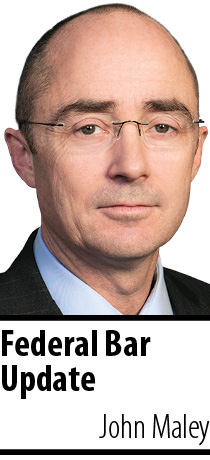Subscriber Benefit
As a subscriber you can listen to articles at work, in the car, or while you work out. Subscribe Now Although many civil cases in Indiana federal court are resolved through the skill of the magistrate judges or private mediation, other cases still proceed to final judgment, either through dismissals, summary judgments or trial on the merits, with both plaintiff and defense judgments. When final judgment is entered, recovery of costs is possible for the prevailing party. To recover or oppose a costs award, a working knowledge is important of the interplay among federal statutes, federal rules, local rules and caselaw.
Although many civil cases in Indiana federal court are resolved through the skill of the magistrate judges or private mediation, other cases still proceed to final judgment, either through dismissals, summary judgments or trial on the merits, with both plaintiff and defense judgments. When final judgment is entered, recovery of costs is possible for the prevailing party. To recover or oppose a costs award, a working knowledge is important of the interplay among federal statutes, federal rules, local rules and caselaw.
The statute
The starting point is 28 U.S.C. § 1920, which defines potentially recoverable costs as follows:
A judge or clerk of any court of the United States may tax as costs the following:
(1) Fees of the clerk and marshal;
(2) Fees for printed or electronically recorded transcripts necessarily obtained for use in the case;
(3) Fees and disbursements for printing and witnesses;
(4) Fees for exemplification and the costs of making copies of any materials where the copies are necessarily obtained for use in the case;
(5) Docket fees under section 1923 of this title;
(6) Compensation of court appointed experts, compensation of interpreters, and salaries, fees, expenses, and costs of special interpretation services under section 1828 of this title.
The most commonly incurred costs are deposition and trial transcripts, which can easily reach five figures, along with copy costs. Notably, expert expenses are not recoverable as costs unless, per subsection (6), the experts were court appointed.
The federal rule
Rule 54, titled “Judgment; Costs,” speaks further to recovery of costs. Specifically, Rule 54(d)(1) provides: “Costs Other Than Attorney’s Fees. Unless a federal statute, these rules, or a court order provides otherwise, costs—other than attorney’s fees—should be allowed to the prevailing party. But costs against the United States, its officers, and its agencies may be imposed only to the extent allowed by law. The clerk may tax costs on 14 days’ notice. On motion served within the next 7 days, the court may review the clerk’s action.”
Local rules — 14 days
In the Southern District of Indiana, Local Rule 54-1(a) provides, “A party cannot recover attorney’s fees and costs unless the party files and serves a bill of costs and a motion for fees within 14 days after final judgment is entered. The court may extend this deadline for good cause if a motion requesting an extension is filed before the original deadline.” Subsection (b) provides that the court “prefers that parties use AO form 133” for the bill of costs. This is available on the court’s website under the Forms section.
Similarly, in the Northern District of Indiana, Local Rule 54-1(a) provides, “To recover costs, a party must file and serve a completed AO Form 133 (available from the clerk or the court’s website) within 14 days after final judgment is entered.” Subsection (b) then provides, “The court may extend the 14-day deadline for good cause if, before the original deadline, the party files a motion requesting an extension.”
Caselaw
With those basics, there is plentiful caselaw on bills of costs from Indiana federal judges. For instance, on May 20, Indiana Southern District Judge Hanlon issued a four-page order granting $1,068.87 in costs against a plaintiff after summary judgment for the defense. Geng v. Harker, 1:19-cv-3139 (S.D. Ind. May 20, 2021). The costs were from the deposition of plaintiff. The order outlines key principles in costs disputes, including:
“‘Under Rule 54(d), district courts enjoy wide discretion in determining and awarding reasonable costs.’ Northbrook Excess and Surplus Ins. Co., v. Proctor & Gamble Co., 924 F.2d 633, 642 (7th Cir. 1991).”
“Rule 54(d) ‘provides a presumption that the losing party will pay costs but grants the court discretion to direct otherwise.’ Rivera v. City of Chicago, 469 F.3d 631, 634 (7th Cir. 2006).”
“Within that discretion, district courts may decline to award costs against an indigent party. Id. at 634–35. However, indigence is a ‘narrow’ exception rather than ‘a blanket excuse’—costs may still be awarded to ‘serve[ ] the valuable purposes of discouraging unmeritorious claims.’ Id. at 635–36.”
Judge Hanlon noted that the threshold factual question when indigence is claimed is “whether the losing party is incapable of paying costs at this time or in the future.” He found that although plaintiff could not pay costs presently, “she may be able to in the future” as she is a highly educated engineer who has been employed in the past and may again be gainfully employed in the future.
Because the amount of costs was modest, defendants prevailed on all issues and there are consequences of lawsuits, Judge Hanlon found that the “‘strong presumption that the prevailing party will recover costs’ has not been overcome. Mother & Father v. Cassidy, 338 F.3d 704, 708 (7th Cir. 2003).”•
• John Maley — [email protected] — is a partner with Barnes & Thornburg LLP, practicing federal and state litigation, employment matters and appeals. He clerked for Judge Larry McKinney from 1988-90. Opinions expressed are those of the author.
Please enable JavaScript to view this content.
